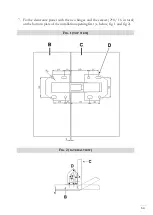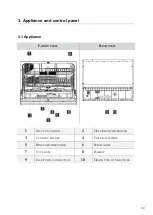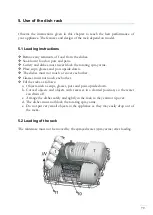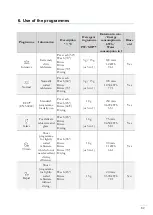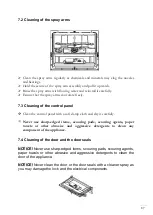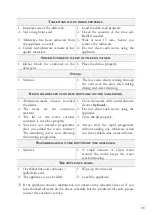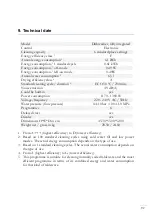
77
4.4 Dishwasher detergent
D
ISHWASHER DETERGENTS ARE DIVIDED INTO
2
GROUPS DUE TO THEIR
CHEMICAL COMPOSITION
:
conventional, alkaline detergents with caustic components.
low-alkaline concentrated detergents with natural enzymes.
"Normal" programmes combined with concentrated detergents prevent pollution
and are also good for your dishes. Such programmes support the washing effect of
the enzymes. Therefore, "normal" programmes combined with concentrated
detergents are as effective as "intensive" programmes.
T
HERE ARE
3
KINDS OF DISHWASHER DETERGENTS
:
1.
with phosphate and chlorine.
2.
with phosphate / without chlorine
3.
without phosphate / without chlorine
Most recent powdered dishwasher detergents usually do not contain any phosphate
so they do not soften the water. In such a case add a water softener(= dishwasher
salt) even if the hardness of water is e.g. 6dH. Otherwise white spots may occur on
your dishes and glasses.
Dishwasher detergents without chlorine only bleach slightly, so they do not remove
tough stains. In such a case select a programme with a higher temperature.
D
ISHWASHER TABS
:
Dishwasher tabs of different manufacturers may need different periods of time for
washing your dishes. So some kinds of tabs cannot be used when operating a short
programme. Always select long lasting programmes to clean your dishes
completely.
T
HE DETERGENT CONTAINER
:
You must fill the container matching the information of the programme
schedule.
Use detergents which are suitable for dishwashers only.
Always keep your detergent dry.
Fill the container just before starting a programme.
The detergent and rinse aid consumption of your appliance is lower than the
consumption of conventional appliances. In general you need 1 tablespoon of
detergent for a normal programme.
You must increase the amount of detergent if your dishes are heavily soiled.
Содержание GS6-6FI2
Страница 18: ...18 ABB 1 SICHT VON OBEN ABB 2 SEITLICHE ANSICHT ...
Страница 22: ...22 ABB A ABB B ABB C ...


